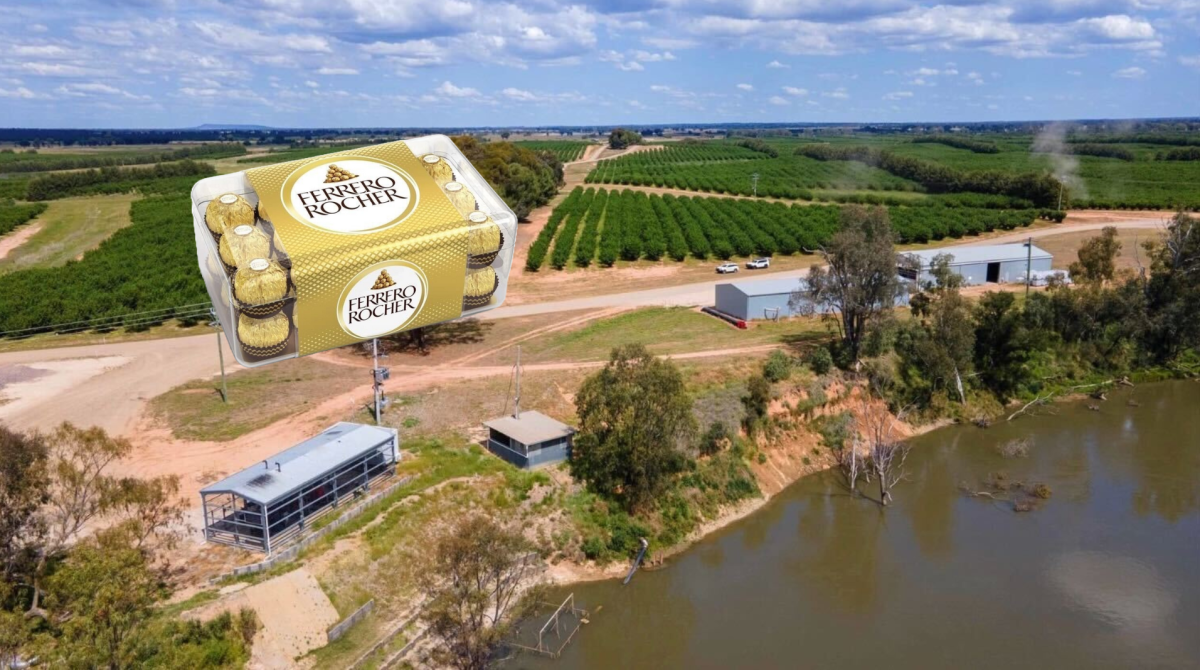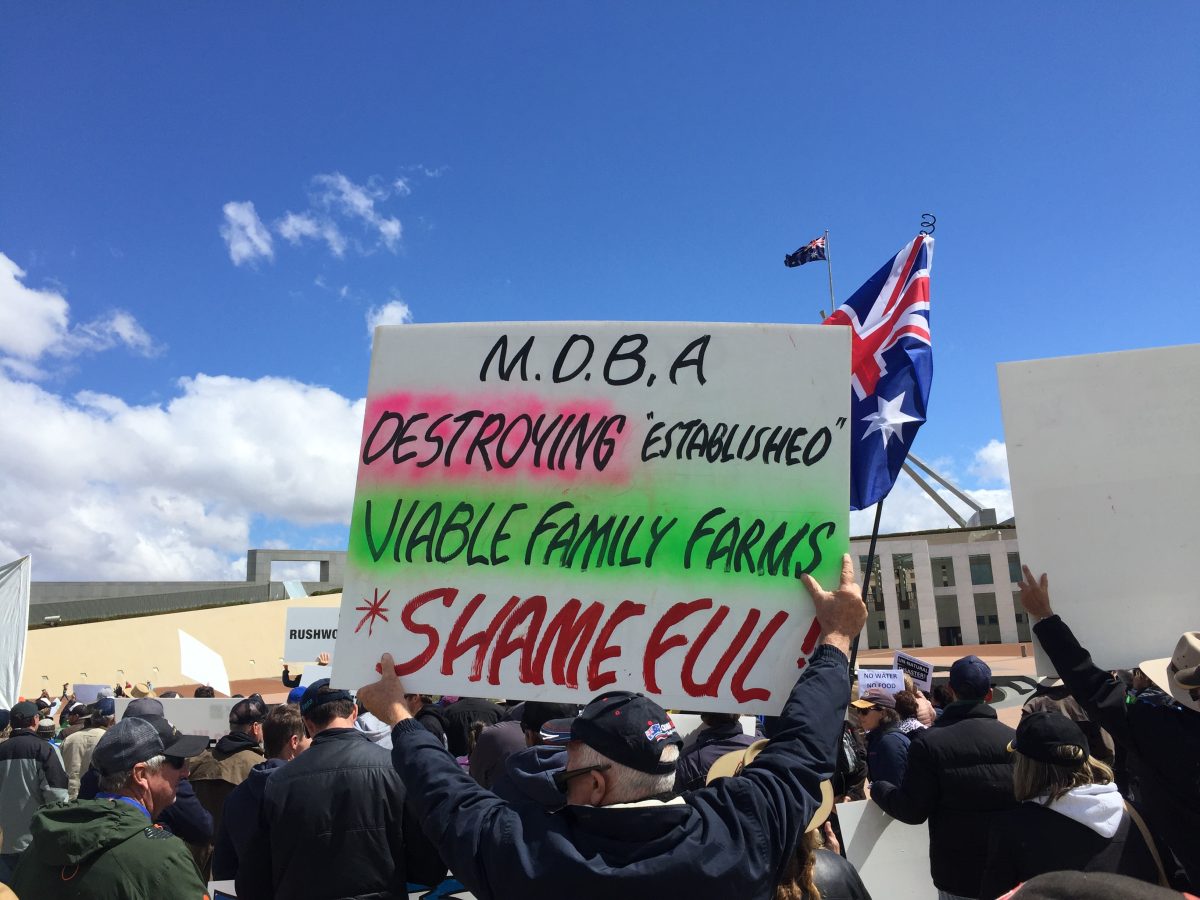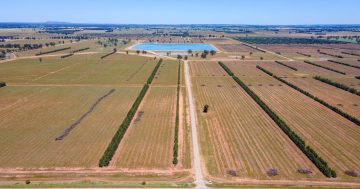
Ferrero Group received federal and state grants to support its nut farm. Photo: CBRE Agribusiness.
Farmers have questioned why Australian taxpayer funds were used to support an Italian multinational’s $70 million water-intensive nut development in Narrandera, which was abandoned late last year.
Ferrero Group, which sells Nutella and Ferrero Rocher chocolates, says it received both federal and state grants to grow hazelnuts on its 2600-hectare Riverina property at Dellapool Road since 2011, though the company claims it invested 10 times as much as it received from taxpayers.
In October 2023, it announced the farm was for sale, meaning a million hazelnut trees had to be ripped from the ground and dozens of locals were left unemployed.
Former Narrandera mayor and neighbouring hazelnut farmer Graham Eipper said he recalled the confectionary giant receiving a $7.5 million grant to upgrade power lines in the early 2010s.
“I don’t think it’s fair,” Mr Eipper said. “There’s a lot of Australians trying to make a quid, and they can’t access this money. The government bends over backwards to help these [foreign] companies move in, take over, then do what they’ve done now – close shop.”
Mel Gray, a former farmer and now a Nature Conservation Council campaigner, wants to see the taxpayers’ money refunded.
“Foreign corporations have no attachment to the local community,” she said. “They’ve got no qualms with just ripping out all their trees and moving to wherever is profitable.
“There should be a bond between multinationals and the community that there will be satisfactory investment in the communities. If not, the companies should be made to donate the money back to the community when they leave.”
Under the Murray Darling Basin Plan, an agreement between the Commonwealth and states to invest money to save the river system, foreign and domestic companies can apply for grants for ”efficiency” and related projects that supposedly reduce water use.
But poor regulation and oversight by state and federal governments has meant some companies have used taxpayer dollars to expand their water extraction.
“Waving around $13 billion for the Murray Darling Basin Plan attracted some big players who were clever and savvy and took advantage of that money to create some perverse outcomes,” Ms Gray said.
She also said she didn’t know why taxpayers’ money was subsidising the growing of nuts, a permanent plantation that uses vast amounts of water, even in dry years.
A UK-based environmental group claims that it takes 4769 litres of water to produce just one pound (450g) of hazelnuts.
Ms Gray said she’d rather see government money spent on voluntary buybacks of irrigation water than on grants for multinationals to expand their infrastructure.
The sale of the Ferrero Group’s hazelnut farm included 11,361 megalitres of water entitlements.
A Federal Government spokeswoman confirmed the Italian company did not seek to sell the water back to the government and that the government has not sought to buy it.
Region asked relevant federal and state government departments how much funding and grants they had given the Ferrero Group since 2011, but they all refused to answer the question.
Some claimed they were unable to look that far back through paper-based records, while others said their departments had been restructured and they didn’t know what their predecessors did.
The Murray Darling Basin Authority, the government body set up to manage the river system, says it did not provide any funding to the Ferrero Group.

Riverina farmers have often protested about the decline of family farms. Photo: Oliver Jacques.
Ferrero Group also declined to provide a dollar amount of the total government funding it received, but a company spokesperson defended its local contribution.
“Ferrero made a significant investment to establish Australia’s first hazelnut research and development (R&D) pilot project. It was partly funded with state and federal grants,” the spokesperson said.
“Over the course of the 10-year project, Ferrero has invested over 10 times the amount initially received in government funding to establish Australia’s first hazelnut R&D centre.
“Furthermore, Ferrero heavily contributed to upgrade the regional electrical grid, which will continue to benefit the farming community.”
The company claimed the Riverina’s harsh climate was the reason for its decision to abandon its “pilot project”.
Mr Eipper, who ran a citrus and hazelnut orchard next door, questioned this justification.
“Our place was right next to theirs, and we were growing hazelnuts under the same conditions,” he said. ”We produced a healthy crop and got good returns.
“They [Ferrero Group] didn’t manage their property well. From what I saw, the weeds were bigger than the trees.”
If you know more about this story, email [email protected].
Original Article published by Oliver Jacques on Region Riverina.








